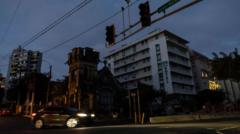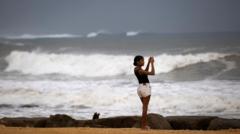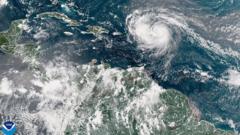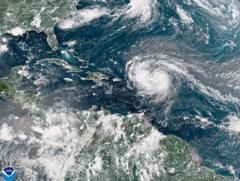Puerto Rico welcomed the New Year in an unprecedented situation as the island experienced a substantial blackout, affecting over 1.2 million customers out of nearly 1.5 million served by the main power distributor, Luma Energy. The sudden power loss on New Year’s Eve left streets darkened and traffic lights unoperational, raising immediate concerns about the unincorporated territory's energy stability.
The cause of this widespread outage is currently under investigation, with Luma Energy estimating a restoration timeline of 24 to 48 hours. However, this incident has reignited urgent discussions about Puerto Rico's longstanding energy challenges, which have been problematic since Hurricane Maria ravaged the island in 2017.
By Tuesday afternoon, some regions, including the municipal hospital in San Juan, had their power restored, but calls for action have only intensified. Jenniffer González-Colon, Puerto Rico's congressional representative and imminent governor, stressed on social media that the island can no longer accept a failing energy system that continually disrupts the lives of its citizens.
Governor Pedro Pierluisi also demanded explanations and solutions from Luma Energy and its counterpart, Genera, highlighting the detrimental effect of incessant blackouts on both the economy and quality of life. Throughout 2023, residents have faced numerous outages, with previous incidents like a June blackout affecting around 350,000 customers during a heatwave and another in August leaving over 700,000 without power after Hurricane Ernesto.
In the wake of yet another blackout, Puerto Ricans expressed their frustration, with daily life becoming increasingly complicated by unreliable energy access. "They're part of my everyday life," lamented Enid Núñez, a local resident, illustrating the pervasive impact of the outages.
The island's electricity infrastructure has struggled even prior to Hurricane Maria, despite federal funding aimed at enhancing recovery efforts and improving essential services. A report from the US Government Accountability Office highlighted the slow progress on construction projects and the complex regulations related to the Federal Emergency Management Agency's funding allocations as contributing factors to the unreliable energy system.
Commenting on the situation, Mark Levine, New York City’s Manhattan borough president, underscored the need for immediate reforms, citing that Puerto Rico's power grid still shows signs of damage from Hurricane Maria, and reminding the public that "3.5 million American citizens" deserve better services.




















